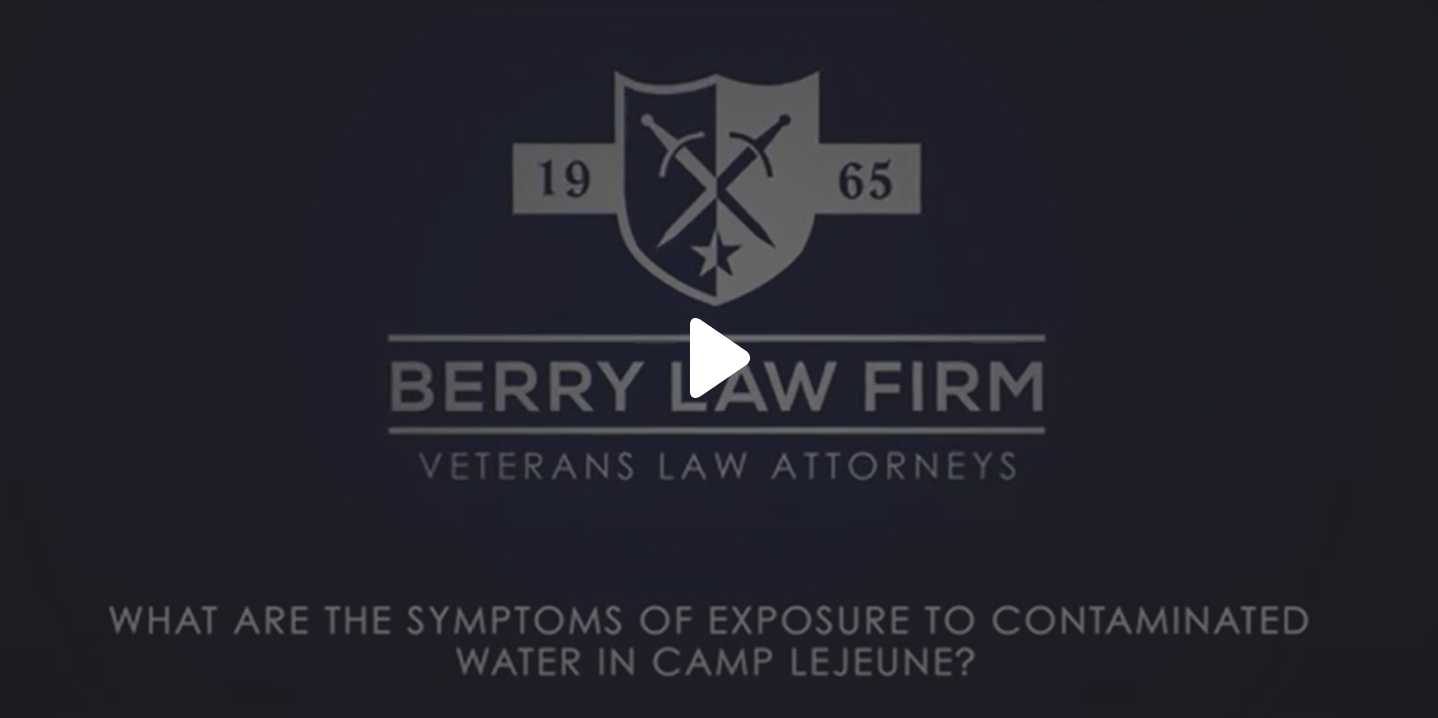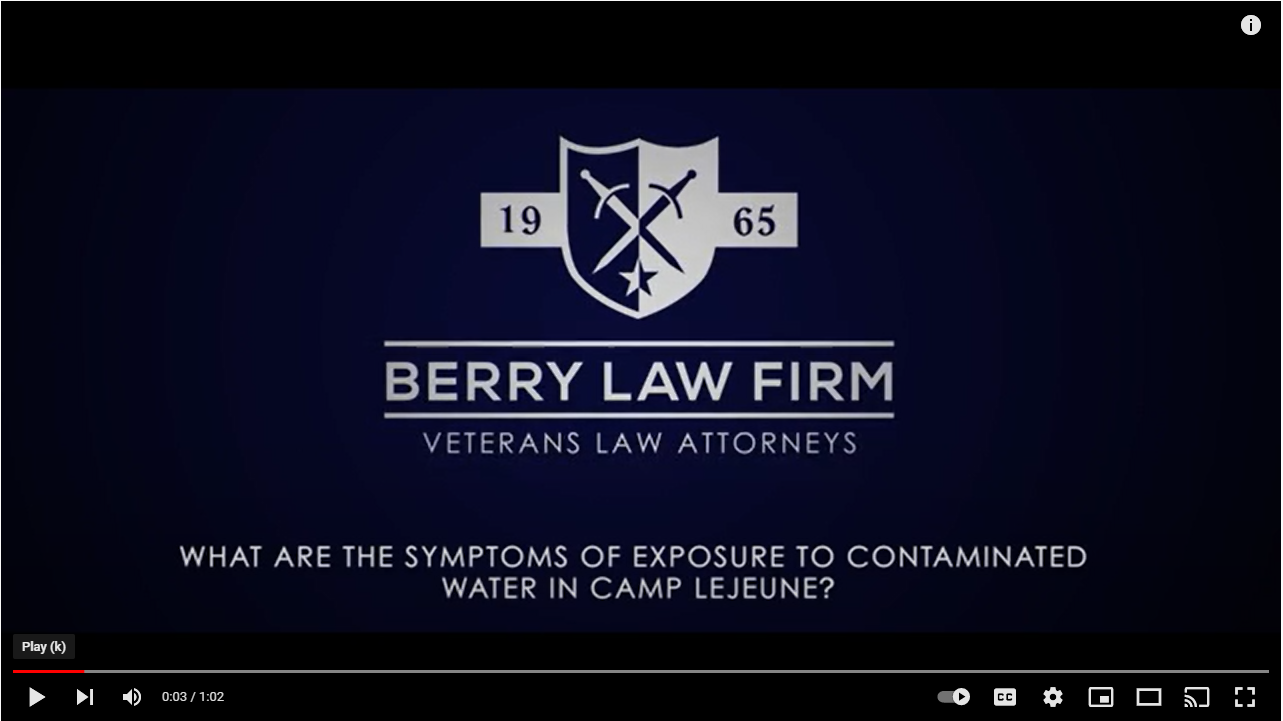John Berry, Army Veteran and CEO of Berry Law, Discusses The Camp Lejeune Justice Act with Frontlines of Freedom host Lt. Col. Denny Gillem, U.S. Army (Retired)
A History of Water Contamination at Camp Lejeune
Camp Lejeune has served as an active Marine Corps training base in Jacksonville, North Carolina, since 1942. It’s one of the busiest and largest Marine Corps bases. For over 34 years, beginning in 1953, dangerous chemicals seeped into the soil from fuel depots, base junkyards, and a local dry cleaner.
The toxic substances poisoned the groundwater and contaminated the drinking water at enlisted-family housing, barracks for unmarried service personnel, base administrative offices, schools, base hospitals, and recreational areas throughout the base.
Nearly one million Marines and their families stationed at Camp Lejeune between 1953 and 1987 were exposed to water contaminated with harmful chemicals that have been linked to multiple cancers, Parkinson’s disease, and neurological disorders.
Finally, in 1985, the military shut down the two wells containing contaminated water after heavy pressure from Veterans, their families, and Veterans’ advocacy groups.
Which Dangerous Chemicals Were Found in the Water at Camp Lejeune?
Testing on two water wells on Camp Lejeune through 1985 found toxic chemicals, including:
- Trichloroethylene (TCE) – is a chemical used to make refrigerants and as a metal degreaser.
- Tetrachloroethylene (PCE) – is a synthetic chemical that is widely used for dry-cleaning fabrics and for metal-degreasing operations.
- Vinyl Chloride (VC) – is a colorless toxic gas used in the production of polyvinyl chloride and other commercially important polymers.
- Benzene – is used in the manufacture of plastics, detergents, pesticides, and other chemicals.
In 2014, the Agency for Toxic Substances and Disease Registry (ATSDR), a public health agency within the U.S. Department of Health and Human Services, issued a statement about the Camp Lejeune water contamination, finding, “Past exposures from the 1950s through February 1985 to trichloroethylene (TCE, tetrachloroethylene (PCE), vinyl chloride, and other contaminants in the drinking water at the Camp Lejeune likely increased the risk of cancers (kidney, multiple myeloma, leukemias, and others), adverse birth outcomes, and other adverse health effects of residents (including infants and children), civilian workers, Marines, and Naval personnel at Camp Lejeune.”
Camp Lejeune Benefits Available Through Veterans Affairs
On Aug. 6, 2012, President Obama signed the “Honoring America’s Veterans and Caring for Camp Lejeune Families Act of 2012,” also known as the Camp Lejeune Act of 2012. This compensation, separate from disability compensation, provides certain VA health care benefits to Veterans and their family members who lived at Camp Lejeune during the contamination period and were diagnosed with a qualifying disease or health condition related to exposure.
These conditions include:
In 2017, Congress passed another statute establishing presumptive service connection for Veterans, Reservists, and National Guard members exposed to contaminated water at Camp Lejeune from August 1, 1953, through December 31, 1987. This measure makes it easier for Veterans to file a VA disability claim for health care benefits. This benefit is also available to Marine Corps Air Station (MACS) New River, North Carolina, Veterans who meet the time-on-station and service date requirements and have one of the covered conditions. Covered conditions under the presumptive service connection include:
- Adult leukemia
- Aplastic anemia and other myelodysplastic syndromes
- Bladder cancer
- Kidney cancer
- Liver cancer
- Multiple myeloma
- Non-Hodgkin’s lymphoma
- Parkinson’s disease
How Do Camp Lejeune Justice Act Lawsuits Differ from VA Benefits?
Until the signing of the Camp Lejeune Justice Act of 2022, those affected by Camp Lejeune water contamination could not recover damages for losses beyond healthcare. The new law allows those affected to file a Camp Lejeune lawsuit against the U.S. government for additional damages.
Compensation Available in Camp Lejeune Claims
Under the Camp Lejeune Justice Act of 2022, qualifying members may receive compensation for damages such as:
- Medical bills
- Pain and suffering
- Lost wages
- Loss of earning capacity
- Loss of companionship
- Loss of consortium
- Loss of enjoyment of life
- Permanent disability
What are the Criteria for Receiving Compensation Under the Camp Lejeune Justice Act of 2022?
To qualify for compensation under the Camp Lejeune Justice Act, military Veterans, their family members, and civilians (including children in utero) must:
- have lived, worked, or were otherwise exposed to water at Camp Lejeune between August 1, 1953 and December 31, 1987 for at least 30 days,
- provide evidence showing a relationship between exposure to the water at Camp Lejeune and the harm they experienced, and,
- file an injury and administrative claim within 2 years of the enactment of the Camp Lejeune Justice Act of 2022.
To verify your legal options and whether you or your family has a viable claim, consult with a Camp Lejeune water contamination attorney.
Contact the Veterans Disability Lawyers at Berry Law Today
For the first time, people who worked, lived, or were exposed in utero to contaminated water at Camp Lejeune between 1953 and 1987 will be able to file a claim in federal court in the United States.
Our attorneys are committed to representing service members and their families who have suffered medically recognized injuries as a result of toxic chemical exposure at Camp Lejeune and will fight for full compensation for their losses. Contact us today for a free consultation.






